Developing Individuals, Teams and Organisations at Whirlpool: A Report
VerifiedAdded on 2021/01/02
|20
|5340
|305
Report
AI Summary
This report examines the essential skills, professional knowledge, and behaviors required of HR professionals, focusing on the context of Whirlpool, a home appliance manufacturer. It includes a mini-research component to determine these requirements, followed by a personal skills audit and the development of a professional development plan. The report analyzes the distinctions between organizational and individual learning, training, and development, and explores how High-Performance Work Systems (HPWS) contribute to employee engagement and competitive advantage. Furthermore, it evaluates various approaches to performance management and their impact on fostering a high-performance culture and commitment within the organization. The analysis provides insights into optimizing HR practices to drive sustainable business performance and achieve organizational goals.
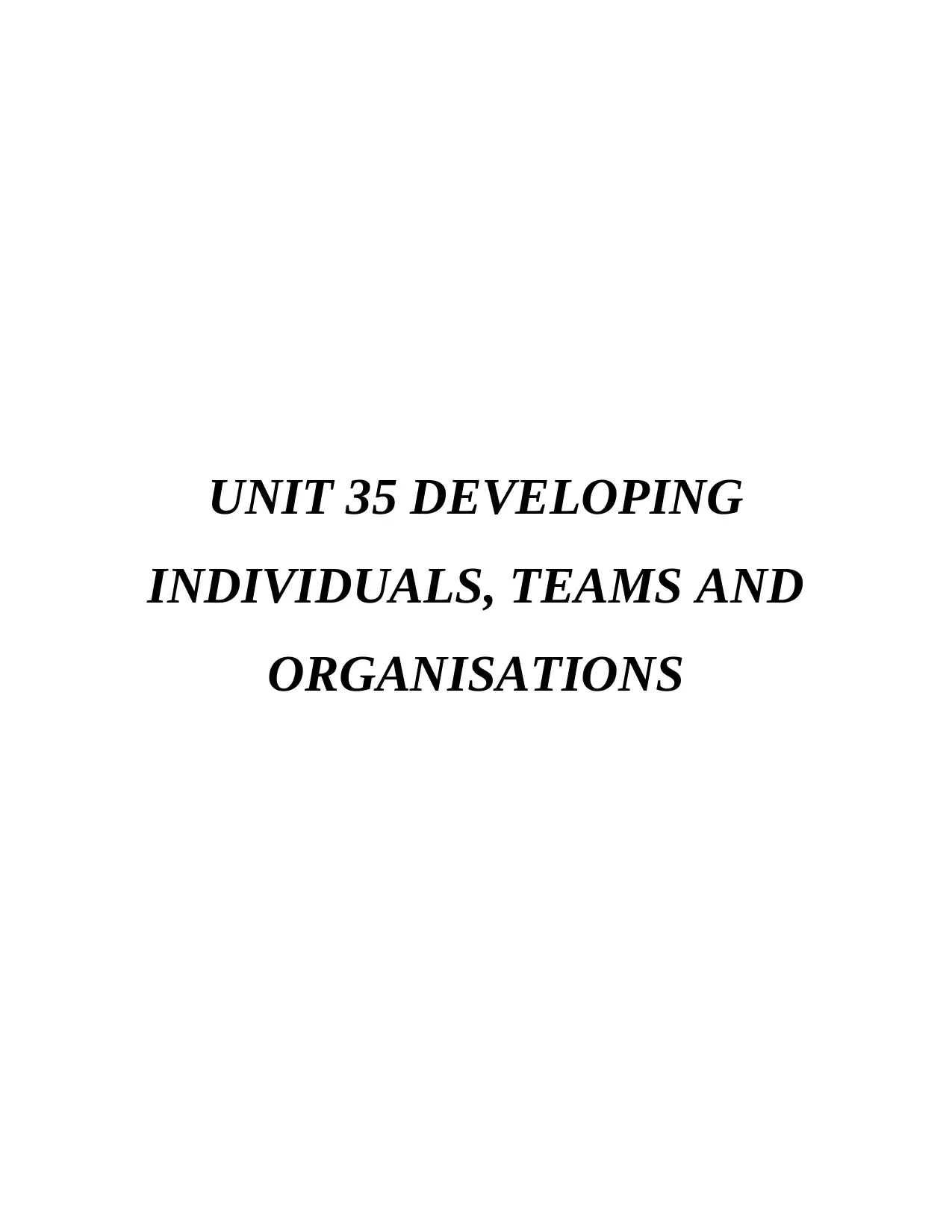
UNIT 35 DEVELOPING
INDIVIDUALS, TEAMS AND
ORGANISATIONS
INDIVIDUALS, TEAMS AND
ORGANISATIONS
Paraphrase This Document
Need a fresh take? Get an instant paraphrase of this document with our AI Paraphraser
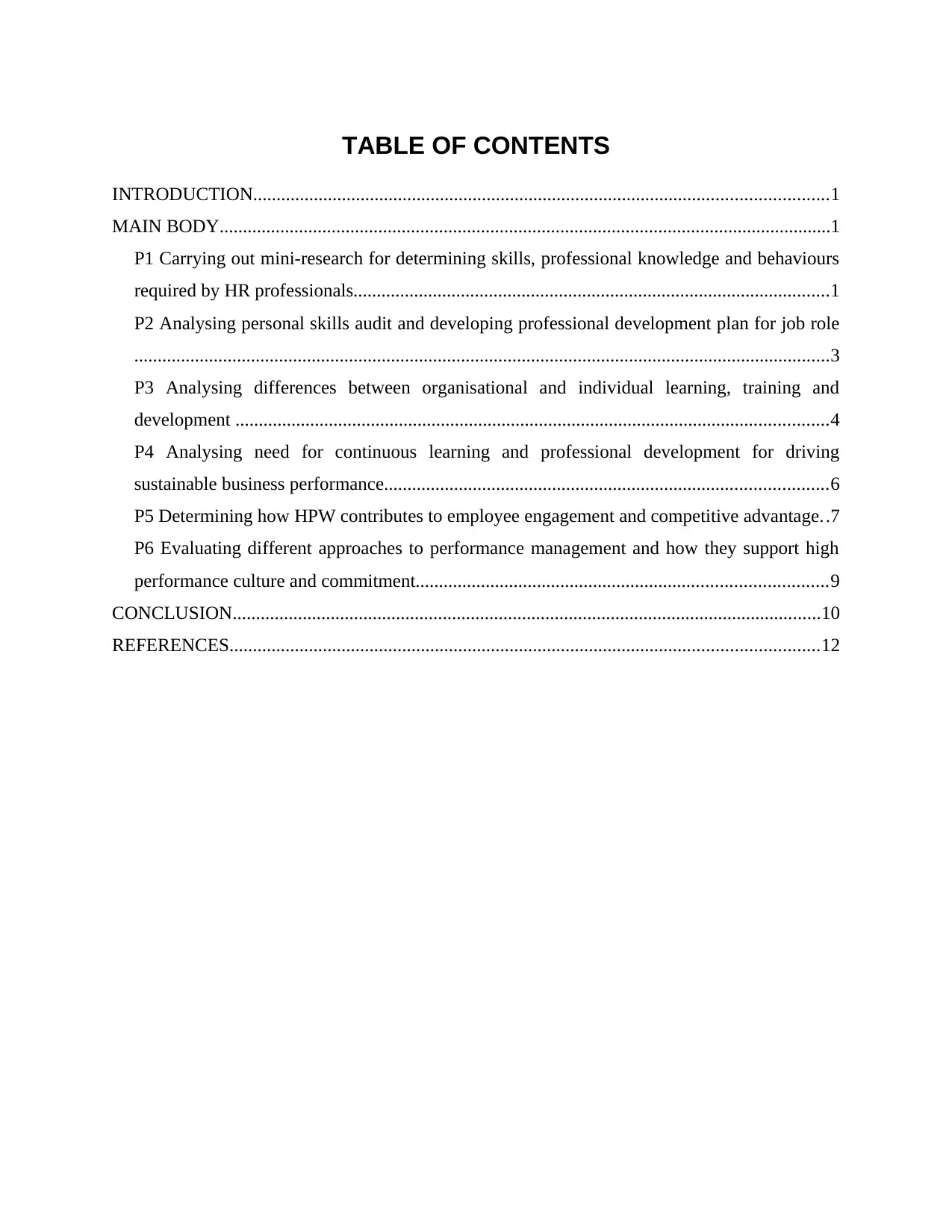
TABLE OF CONTENTS
INTRODUCTION...........................................................................................................................1
MAIN BODY...................................................................................................................................1
P1 Carrying out mini-research for determining skills, professional knowledge and behaviours
required by HR professionals......................................................................................................1
P2 Analysing personal skills audit and developing professional development plan for job role
.....................................................................................................................................................3
P3 Analysing differences between organisational and individual learning, training and
development ...............................................................................................................................4
P4 Analysing need for continuous learning and professional development for driving
sustainable business performance...............................................................................................6
P5 Determining how HPW contributes to employee engagement and competitive advantage..7
P6 Evaluating different approaches to performance management and how they support high
performance culture and commitment........................................................................................9
CONCLUSION..............................................................................................................................10
REFERENCES..............................................................................................................................12
INTRODUCTION...........................................................................................................................1
MAIN BODY...................................................................................................................................1
P1 Carrying out mini-research for determining skills, professional knowledge and behaviours
required by HR professionals......................................................................................................1
P2 Analysing personal skills audit and developing professional development plan for job role
.....................................................................................................................................................3
P3 Analysing differences between organisational and individual learning, training and
development ...............................................................................................................................4
P4 Analysing need for continuous learning and professional development for driving
sustainable business performance...............................................................................................6
P5 Determining how HPW contributes to employee engagement and competitive advantage..7
P6 Evaluating different approaches to performance management and how they support high
performance culture and commitment........................................................................................9
CONCLUSION..............................................................................................................................10
REFERENCES..............................................................................................................................12
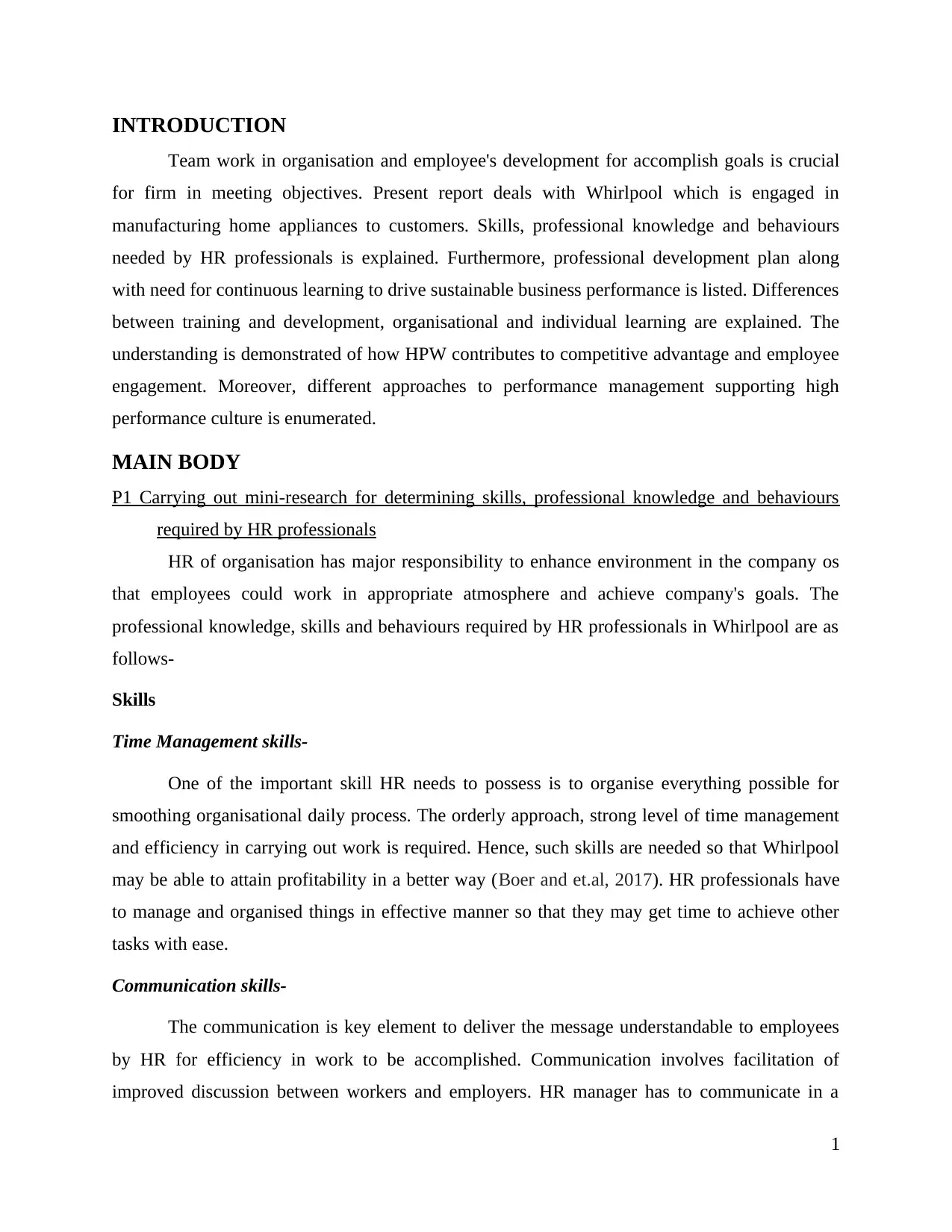
INTRODUCTION
Team work in organisation and employee's development for accomplish goals is crucial
for firm in meeting objectives. Present report deals with Whirlpool which is engaged in
manufacturing home appliances to customers. Skills, professional knowledge and behaviours
needed by HR professionals is explained. Furthermore, professional development plan along
with need for continuous learning to drive sustainable business performance is listed. Differences
between training and development, organisational and individual learning are explained. The
understanding is demonstrated of how HPW contributes to competitive advantage and employee
engagement. Moreover, different approaches to performance management supporting high
performance culture is enumerated.
MAIN BODY
P1 Carrying out mini-research for determining skills, professional knowledge and behaviours
required by HR professionals
HR of organisation has major responsibility to enhance environment in the company os
that employees could work in appropriate atmosphere and achieve company's goals. The
professional knowledge, skills and behaviours required by HR professionals in Whirlpool are as
follows-
Skills
Time Management skills-
One of the important skill HR needs to possess is to organise everything possible for
smoothing organisational daily process. The orderly approach, strong level of time management
and efficiency in carrying out work is required. Hence, such skills are needed so that Whirlpool
may be able to attain profitability in a better way (Boer and et.al, 2017). HR professionals have
to manage and organised things in effective manner so that they may get time to achieve other
tasks with ease.
Communication skills-
The communication is key element to deliver the message understandable to employees
by HR for efficiency in work to be accomplished. Communication involves facilitation of
improved discussion between workers and employers. HR manager has to communicate in a
1
Team work in organisation and employee's development for accomplish goals is crucial
for firm in meeting objectives. Present report deals with Whirlpool which is engaged in
manufacturing home appliances to customers. Skills, professional knowledge and behaviours
needed by HR professionals is explained. Furthermore, professional development plan along
with need for continuous learning to drive sustainable business performance is listed. Differences
between training and development, organisational and individual learning are explained. The
understanding is demonstrated of how HPW contributes to competitive advantage and employee
engagement. Moreover, different approaches to performance management supporting high
performance culture is enumerated.
MAIN BODY
P1 Carrying out mini-research for determining skills, professional knowledge and behaviours
required by HR professionals
HR of organisation has major responsibility to enhance environment in the company os
that employees could work in appropriate atmosphere and achieve company's goals. The
professional knowledge, skills and behaviours required by HR professionals in Whirlpool are as
follows-
Skills
Time Management skills-
One of the important skill HR needs to possess is to organise everything possible for
smoothing organisational daily process. The orderly approach, strong level of time management
and efficiency in carrying out work is required. Hence, such skills are needed so that Whirlpool
may be able to attain profitability in a better way (Boer and et.al, 2017). HR professionals have
to manage and organised things in effective manner so that they may get time to achieve other
tasks with ease.
Communication skills-
The communication is key element to deliver the message understandable to employees
by HR for efficiency in work to be accomplished. Communication involves facilitation of
improved discussion between workers and employers. HR manager has to communicate in a
1
⊘ This is a preview!⊘
Do you want full access?
Subscribe today to unlock all pages.

Trusted by 1+ million students worldwide
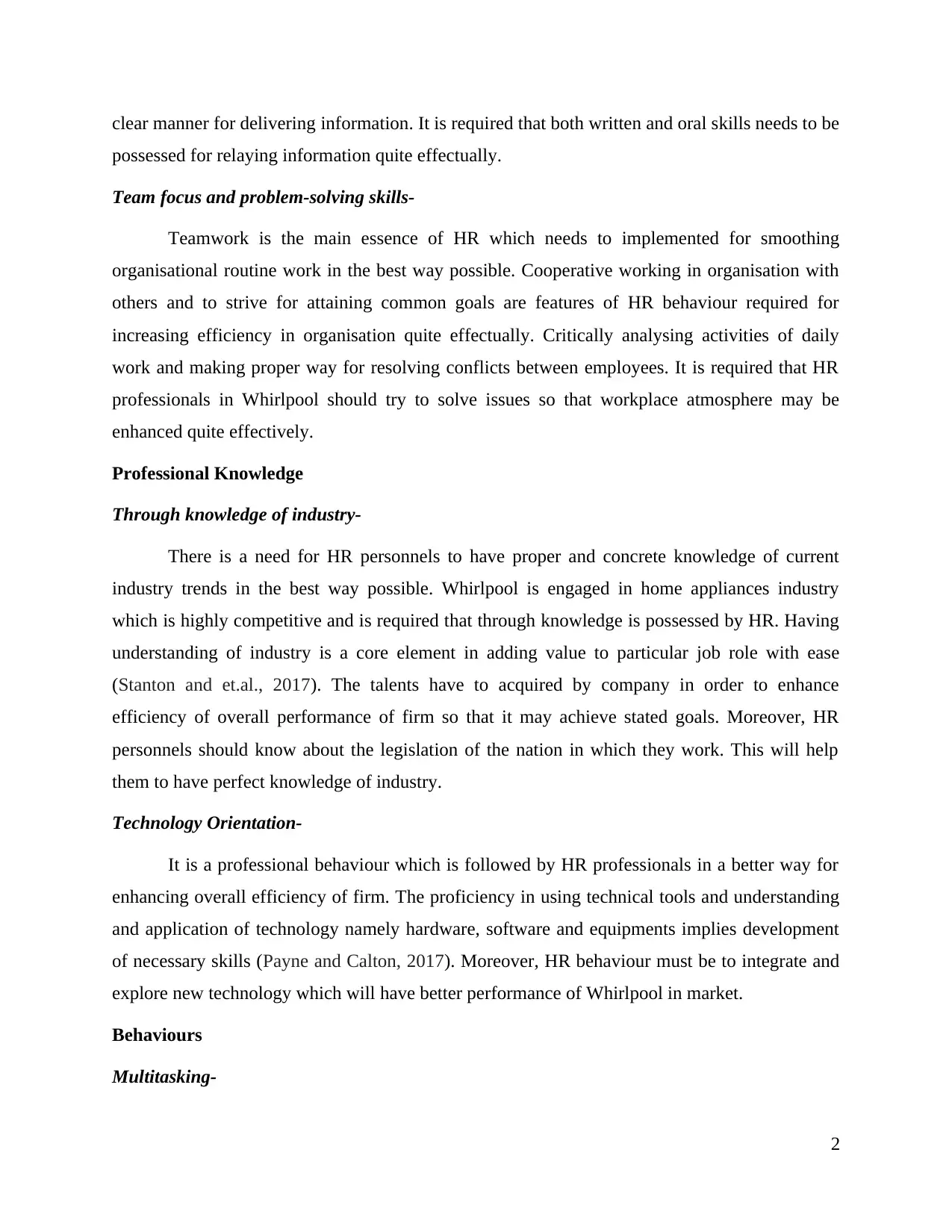
clear manner for delivering information. It is required that both written and oral skills needs to be
possessed for relaying information quite effectually.
Team focus and problem-solving skills-
Teamwork is the main essence of HR which needs to implemented for smoothing
organisational routine work in the best way possible. Cooperative working in organisation with
others and to strive for attaining common goals are features of HR behaviour required for
increasing efficiency in organisation quite effectually. Critically analysing activities of daily
work and making proper way for resolving conflicts between employees. It is required that HR
professionals in Whirlpool should try to solve issues so that workplace atmosphere may be
enhanced quite effectively.
Professional Knowledge
Through knowledge of industry-
There is a need for HR personnels to have proper and concrete knowledge of current
industry trends in the best way possible. Whirlpool is engaged in home appliances industry
which is highly competitive and is required that through knowledge is possessed by HR. Having
understanding of industry is a core element in adding value to particular job role with ease
(Stanton and et.al., 2017). The talents have to acquired by company in order to enhance
efficiency of overall performance of firm so that it may achieve stated goals. Moreover, HR
personnels should know about the legislation of the nation in which they work. This will help
them to have perfect knowledge of industry.
Technology Orientation-
It is a professional behaviour which is followed by HR professionals in a better way for
enhancing overall efficiency of firm. The proficiency in using technical tools and understanding
and application of technology namely hardware, software and equipments implies development
of necessary skills (Payne and Calton, 2017). Moreover, HR behaviour must be to integrate and
explore new technology which will have better performance of Whirlpool in market.
Behaviours
Multitasking-
2
possessed for relaying information quite effectually.
Team focus and problem-solving skills-
Teamwork is the main essence of HR which needs to implemented for smoothing
organisational routine work in the best way possible. Cooperative working in organisation with
others and to strive for attaining common goals are features of HR behaviour required for
increasing efficiency in organisation quite effectually. Critically analysing activities of daily
work and making proper way for resolving conflicts between employees. It is required that HR
professionals in Whirlpool should try to solve issues so that workplace atmosphere may be
enhanced quite effectively.
Professional Knowledge
Through knowledge of industry-
There is a need for HR personnels to have proper and concrete knowledge of current
industry trends in the best way possible. Whirlpool is engaged in home appliances industry
which is highly competitive and is required that through knowledge is possessed by HR. Having
understanding of industry is a core element in adding value to particular job role with ease
(Stanton and et.al., 2017). The talents have to acquired by company in order to enhance
efficiency of overall performance of firm so that it may achieve stated goals. Moreover, HR
personnels should know about the legislation of the nation in which they work. This will help
them to have perfect knowledge of industry.
Technology Orientation-
It is a professional behaviour which is followed by HR professionals in a better way for
enhancing overall efficiency of firm. The proficiency in using technical tools and understanding
and application of technology namely hardware, software and equipments implies development
of necessary skills (Payne and Calton, 2017). Moreover, HR behaviour must be to integrate and
explore new technology which will have better performance of Whirlpool in market.
Behaviours
Multitasking-
2
Paraphrase This Document
Need a fresh take? Get an instant paraphrase of this document with our AI Paraphraser
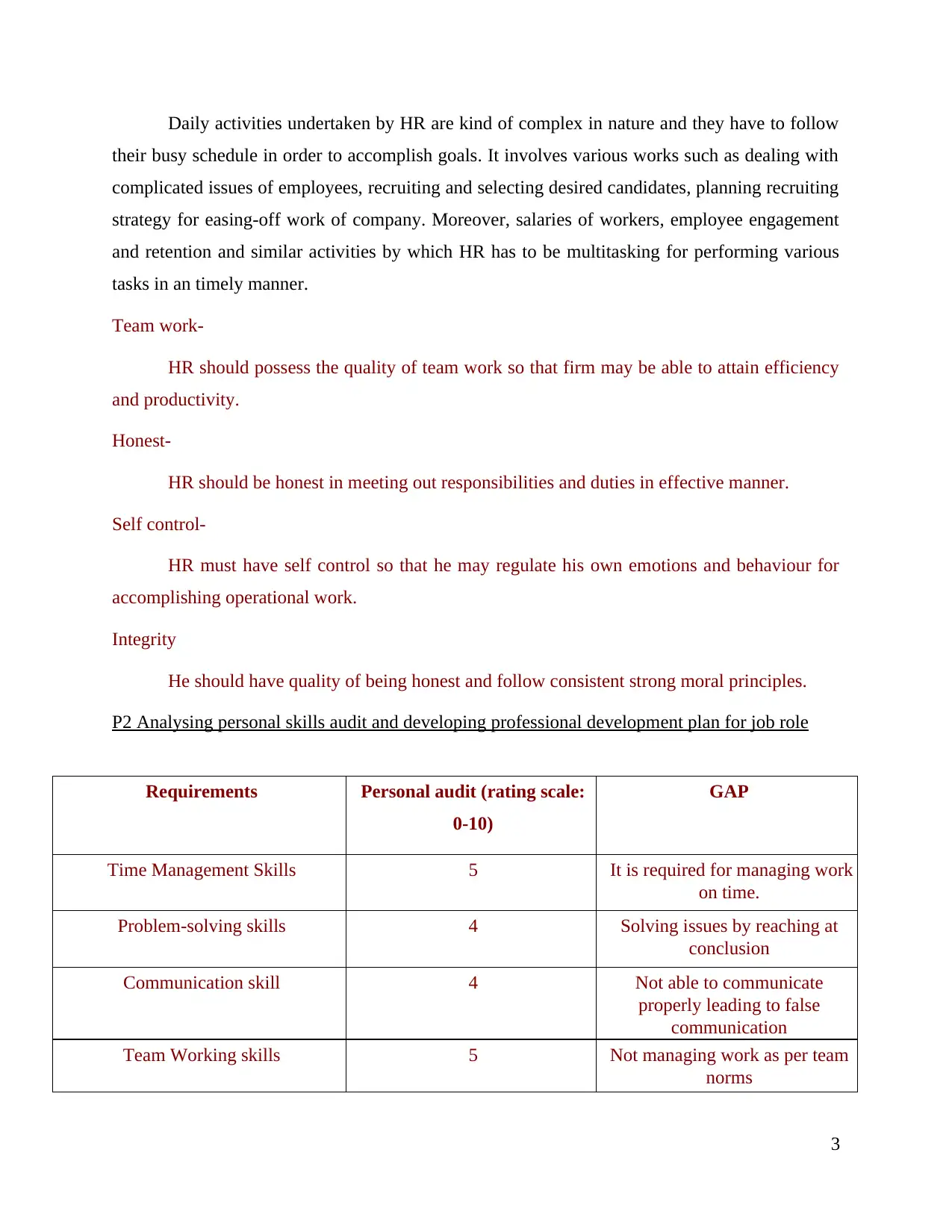
Daily activities undertaken by HR are kind of complex in nature and they have to follow
their busy schedule in order to accomplish goals. It involves various works such as dealing with
complicated issues of employees, recruiting and selecting desired candidates, planning recruiting
strategy for easing-off work of company. Moreover, salaries of workers, employee engagement
and retention and similar activities by which HR has to be multitasking for performing various
tasks in an timely manner.
Team work-
HR should possess the quality of team work so that firm may be able to attain efficiency
and productivity.
Honest-
HR should be honest in meeting out responsibilities and duties in effective manner.
Self control-
HR must have self control so that he may regulate his own emotions and behaviour for
accomplishing operational work.
Integrity
He should have quality of being honest and follow consistent strong moral principles.
P2 Analysing personal skills audit and developing professional development plan for job role
Requirements Personal audit (rating scale:
0-10)
GAP
Time Management Skills 5 It is required for managing work
on time.
Problem-solving skills 4 Solving issues by reaching at
conclusion
Communication skill 4 Not able to communicate
properly leading to false
communication
Team Working skills 5 Not managing work as per team
norms
3
their busy schedule in order to accomplish goals. It involves various works such as dealing with
complicated issues of employees, recruiting and selecting desired candidates, planning recruiting
strategy for easing-off work of company. Moreover, salaries of workers, employee engagement
and retention and similar activities by which HR has to be multitasking for performing various
tasks in an timely manner.
Team work-
HR should possess the quality of team work so that firm may be able to attain efficiency
and productivity.
Honest-
HR should be honest in meeting out responsibilities and duties in effective manner.
Self control-
HR must have self control so that he may regulate his own emotions and behaviour for
accomplishing operational work.
Integrity
He should have quality of being honest and follow consistent strong moral principles.
P2 Analysing personal skills audit and developing professional development plan for job role
Requirements Personal audit (rating scale:
0-10)
GAP
Time Management Skills 5 It is required for managing work
on time.
Problem-solving skills 4 Solving issues by reaching at
conclusion
Communication skill 4 Not able to communicate
properly leading to false
communication
Team Working skills 5 Not managing work as per team
norms
3
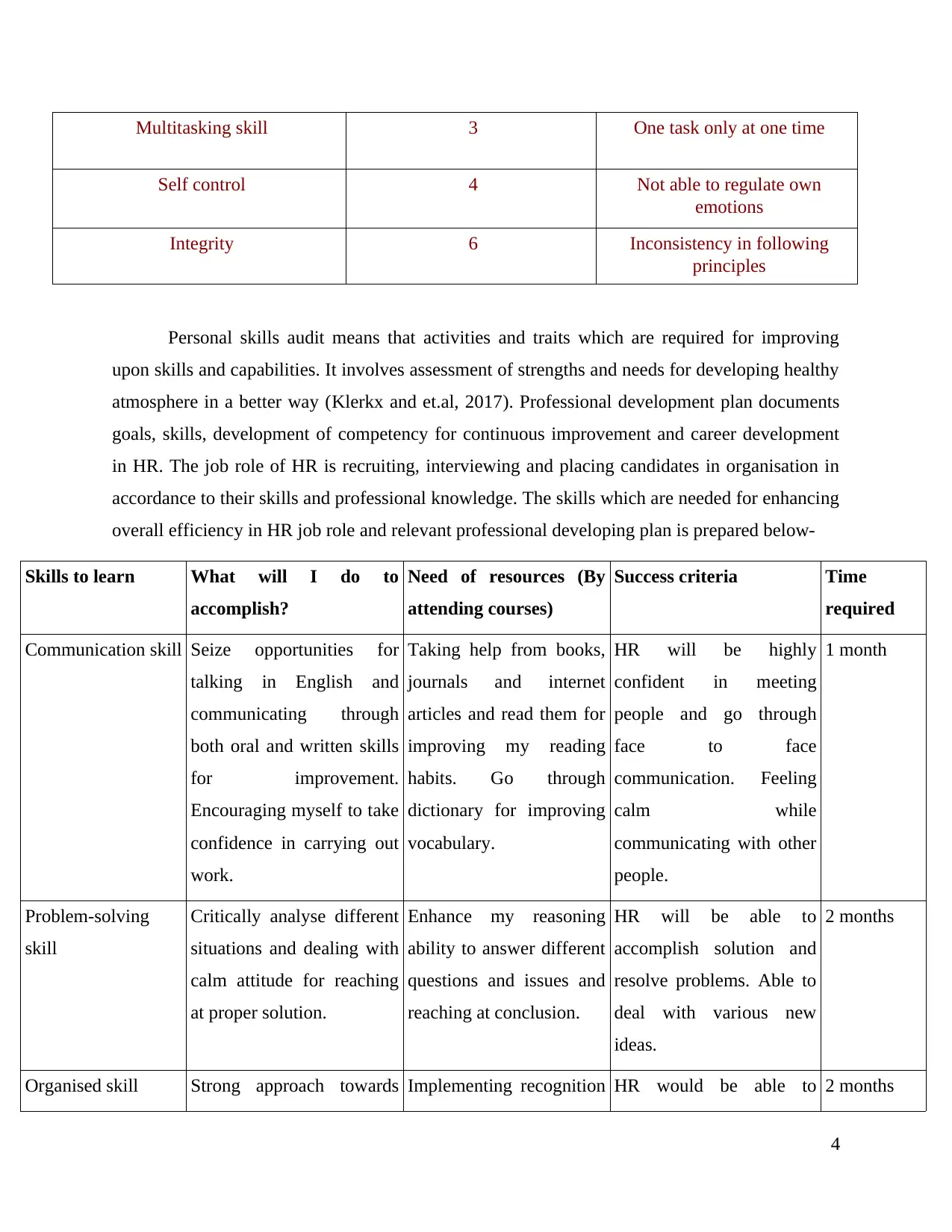
Multitasking skill 3 One task only at one time
Self control 4 Not able to regulate own
emotions
Integrity 6 Inconsistency in following
principles
Personal skills audit means that activities and traits which are required for improving
upon skills and capabilities. It involves assessment of strengths and needs for developing healthy
atmosphere in a better way (Klerkx and et.al, 2017). Professional development plan documents
goals, skills, development of competency for continuous improvement and career development
in HR. The job role of HR is recruiting, interviewing and placing candidates in organisation in
accordance to their skills and professional knowledge. The skills which are needed for enhancing
overall efficiency in HR job role and relevant professional developing plan is prepared below-
Skills to learn What will I do to
accomplish?
Need of resources (By
attending courses)
Success criteria Time
required
Communication skill Seize opportunities for
talking in English and
communicating through
both oral and written skills
for improvement.
Encouraging myself to take
confidence in carrying out
work.
Taking help from books,
journals and internet
articles and read them for
improving my reading
habits. Go through
dictionary for improving
vocabulary.
HR will be highly
confident in meeting
people and go through
face to face
communication. Feeling
calm while
communicating with other
people.
1 month
Problem-solving
skill
Critically analyse different
situations and dealing with
calm attitude for reaching
at proper solution.
Enhance my reasoning
ability to answer different
questions and issues and
reaching at conclusion.
HR will be able to
accomplish solution and
resolve problems. Able to
deal with various new
ideas.
2 months
Organised skill Strong approach towards Implementing recognition HR would be able to 2 months
4
Self control 4 Not able to regulate own
emotions
Integrity 6 Inconsistency in following
principles
Personal skills audit means that activities and traits which are required for improving
upon skills and capabilities. It involves assessment of strengths and needs for developing healthy
atmosphere in a better way (Klerkx and et.al, 2017). Professional development plan documents
goals, skills, development of competency for continuous improvement and career development
in HR. The job role of HR is recruiting, interviewing and placing candidates in organisation in
accordance to their skills and professional knowledge. The skills which are needed for enhancing
overall efficiency in HR job role and relevant professional developing plan is prepared below-
Skills to learn What will I do to
accomplish?
Need of resources (By
attending courses)
Success criteria Time
required
Communication skill Seize opportunities for
talking in English and
communicating through
both oral and written skills
for improvement.
Encouraging myself to take
confidence in carrying out
work.
Taking help from books,
journals and internet
articles and read them for
improving my reading
habits. Go through
dictionary for improving
vocabulary.
HR will be highly
confident in meeting
people and go through
face to face
communication. Feeling
calm while
communicating with other
people.
1 month
Problem-solving
skill
Critically analyse different
situations and dealing with
calm attitude for reaching
at proper solution.
Enhance my reasoning
ability to answer different
questions and issues and
reaching at conclusion.
HR will be able to
accomplish solution and
resolve problems. Able to
deal with various new
ideas.
2 months
Organised skill Strong approach towards Implementing recognition HR would be able to 2 months
4
⊘ This is a preview!⊘
Do you want full access?
Subscribe today to unlock all pages.

Trusted by 1+ million students worldwide
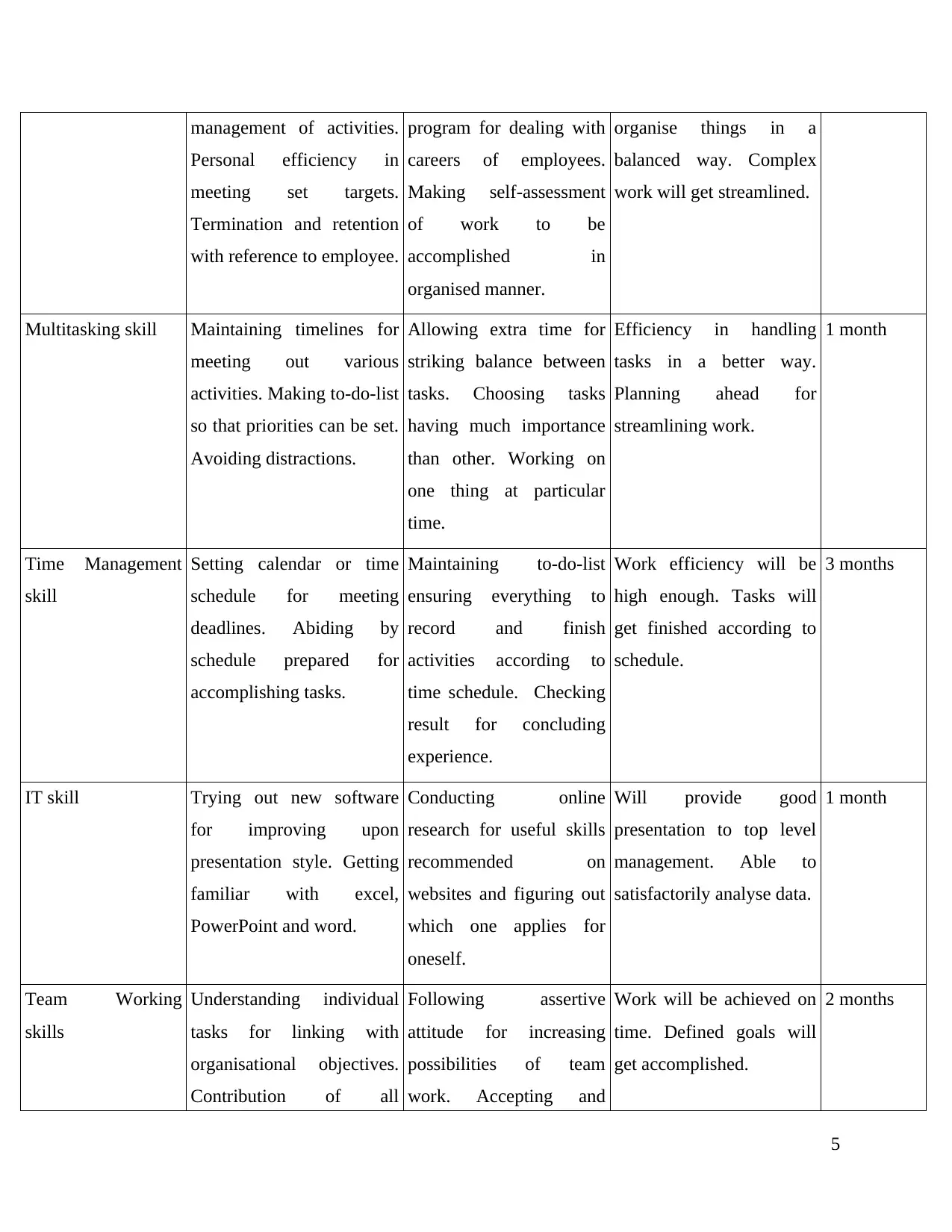
management of activities.
Personal efficiency in
meeting set targets.
Termination and retention
with reference to employee.
program for dealing with
careers of employees.
Making self-assessment
of work to be
accomplished in
organised manner.
organise things in a
balanced way. Complex
work will get streamlined.
Multitasking skill Maintaining timelines for
meeting out various
activities. Making to-do-list
so that priorities can be set.
Avoiding distractions.
Allowing extra time for
striking balance between
tasks. Choosing tasks
having much importance
than other. Working on
one thing at particular
time.
Efficiency in handling
tasks in a better way.
Planning ahead for
streamlining work.
1 month
Time Management
skill
Setting calendar or time
schedule for meeting
deadlines. Abiding by
schedule prepared for
accomplishing tasks.
Maintaining to-do-list
ensuring everything to
record and finish
activities according to
time schedule. Checking
result for concluding
experience.
Work efficiency will be
high enough. Tasks will
get finished according to
schedule.
3 months
IT skill Trying out new software
for improving upon
presentation style. Getting
familiar with excel,
PowerPoint and word.
Conducting online
research for useful skills
recommended on
websites and figuring out
which one applies for
oneself.
Will provide good
presentation to top level
management. Able to
satisfactorily analyse data.
1 month
Team Working
skills
Understanding individual
tasks for linking with
organisational objectives.
Contribution of all
Following assertive
attitude for increasing
possibilities of team
work. Accepting and
Work will be achieved on
time. Defined goals will
get accomplished.
2 months
5
Personal efficiency in
meeting set targets.
Termination and retention
with reference to employee.
program for dealing with
careers of employees.
Making self-assessment
of work to be
accomplished in
organised manner.
organise things in a
balanced way. Complex
work will get streamlined.
Multitasking skill Maintaining timelines for
meeting out various
activities. Making to-do-list
so that priorities can be set.
Avoiding distractions.
Allowing extra time for
striking balance between
tasks. Choosing tasks
having much importance
than other. Working on
one thing at particular
time.
Efficiency in handling
tasks in a better way.
Planning ahead for
streamlining work.
1 month
Time Management
skill
Setting calendar or time
schedule for meeting
deadlines. Abiding by
schedule prepared for
accomplishing tasks.
Maintaining to-do-list
ensuring everything to
record and finish
activities according to
time schedule. Checking
result for concluding
experience.
Work efficiency will be
high enough. Tasks will
get finished according to
schedule.
3 months
IT skill Trying out new software
for improving upon
presentation style. Getting
familiar with excel,
PowerPoint and word.
Conducting online
research for useful skills
recommended on
websites and figuring out
which one applies for
oneself.
Will provide good
presentation to top level
management. Able to
satisfactorily analyse data.
1 month
Team Working
skills
Understanding individual
tasks for linking with
organisational objectives.
Contribution of all
Following assertive
attitude for increasing
possibilities of team
work. Accepting and
Work will be achieved on
time. Defined goals will
get accomplished.
2 months
5
Paraphrase This Document
Need a fresh take? Get an instant paraphrase of this document with our AI Paraphraser
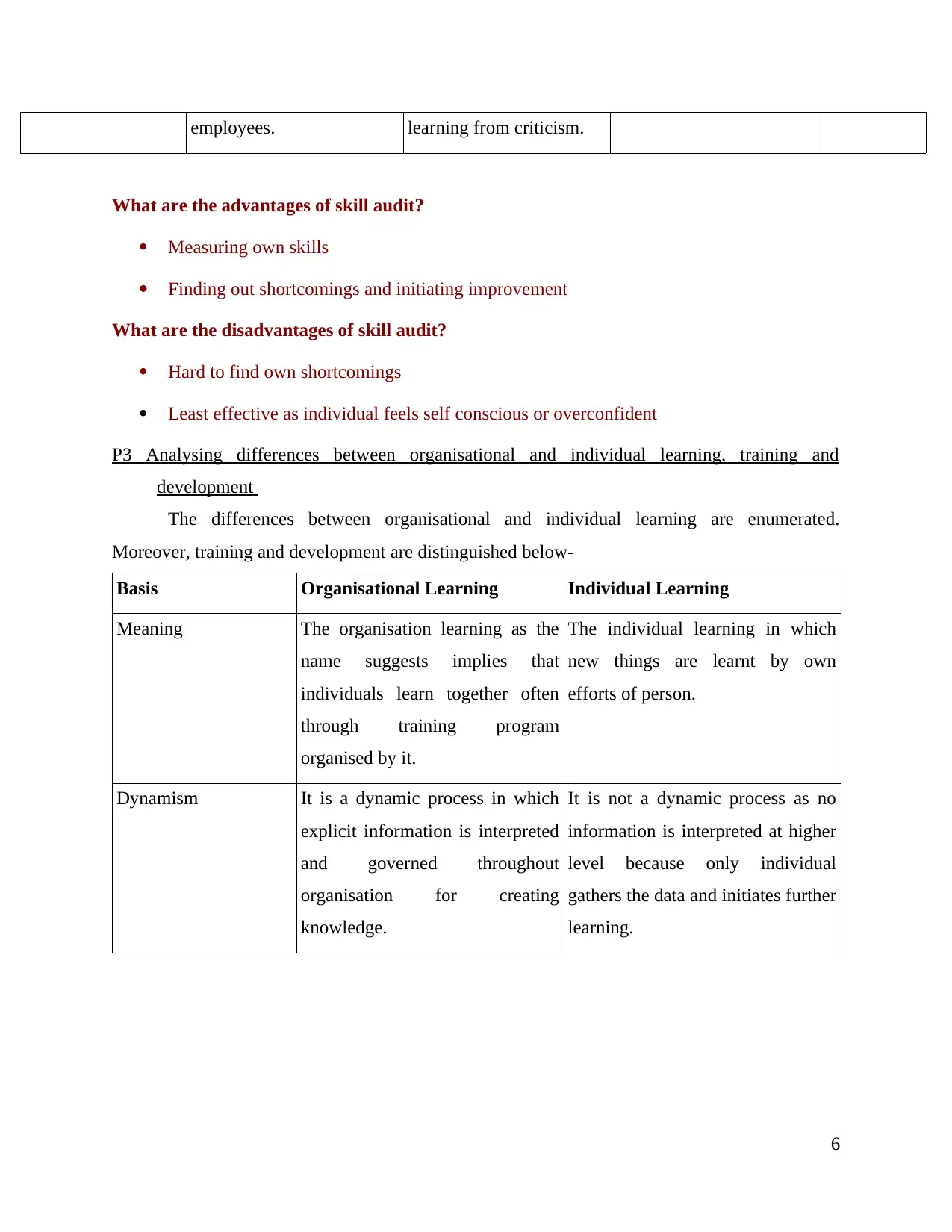
employees. learning from criticism.
What are the advantages of skill audit?
Measuring own skills
Finding out shortcomings and initiating improvement
What are the disadvantages of skill audit?
Hard to find own shortcomings
Least effective as individual feels self conscious or overconfident
P3 Analysing differences between organisational and individual learning, training and
development
The differences between organisational and individual learning are enumerated.
Moreover, training and development are distinguished below-
Basis Organisational Learning Individual Learning
Meaning The organisation learning as the
name suggests implies that
individuals learn together often
through training program
organised by it.
The individual learning in which
new things are learnt by own
efforts of person.
Dynamism It is a dynamic process in which
explicit information is interpreted
and governed throughout
organisation for creating
knowledge.
It is not a dynamic process as no
information is interpreted at higher
level because only individual
gathers the data and initiates further
learning.
6
What are the advantages of skill audit?
Measuring own skills
Finding out shortcomings and initiating improvement
What are the disadvantages of skill audit?
Hard to find own shortcomings
Least effective as individual feels self conscious or overconfident
P3 Analysing differences between organisational and individual learning, training and
development
The differences between organisational and individual learning are enumerated.
Moreover, training and development are distinguished below-
Basis Organisational Learning Individual Learning
Meaning The organisation learning as the
name suggests implies that
individuals learn together often
through training program
organised by it.
The individual learning in which
new things are learnt by own
efforts of person.
Dynamism It is a dynamic process in which
explicit information is interpreted
and governed throughout
organisation for creating
knowledge.
It is not a dynamic process as no
information is interpreted at higher
level because only individual
gathers the data and initiates further
learning.
6
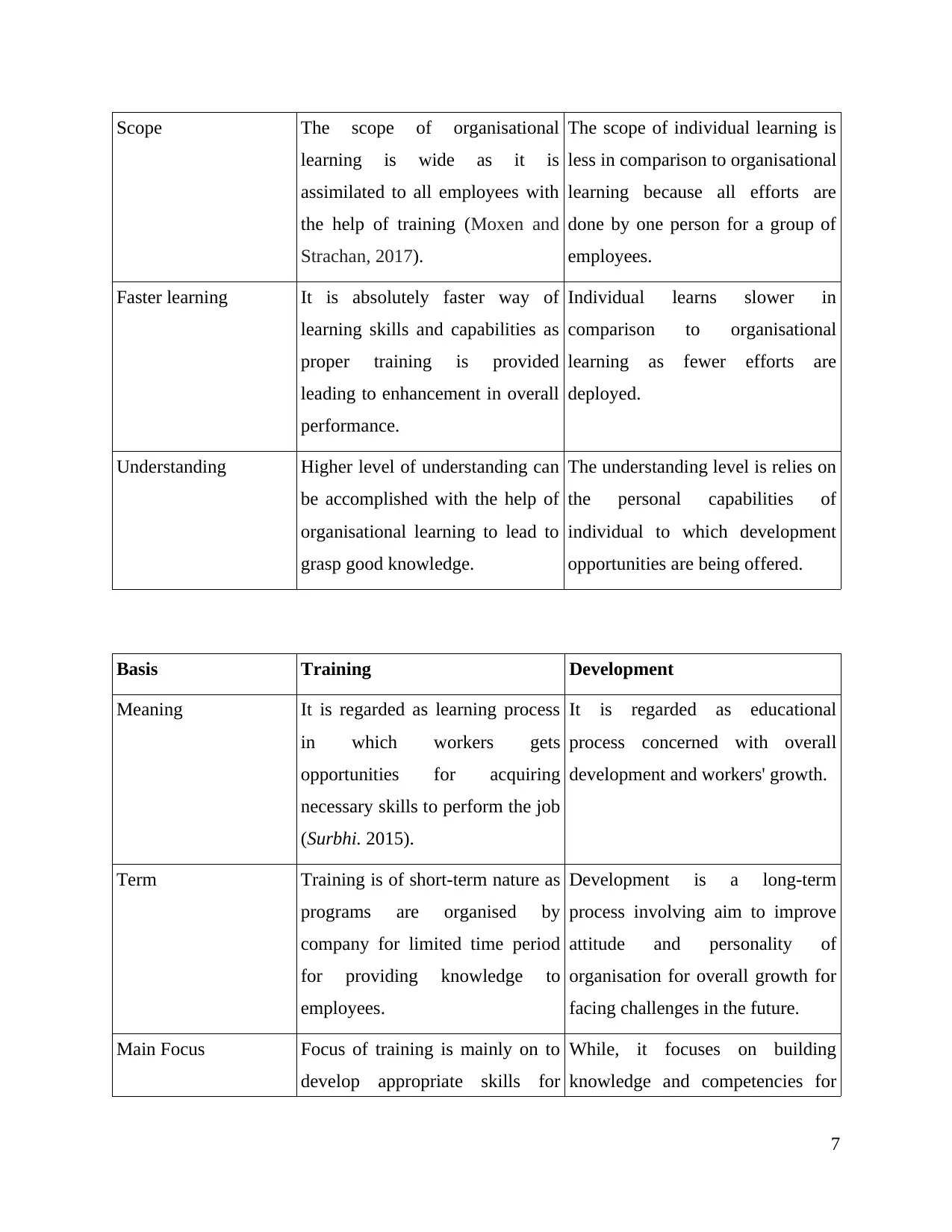
Scope The scope of organisational
learning is wide as it is
assimilated to all employees with
the help of training (Moxen and
Strachan, 2017).
The scope of individual learning is
less in comparison to organisational
learning because all efforts are
done by one person for a group of
employees.
Faster learning It is absolutely faster way of
learning skills and capabilities as
proper training is provided
leading to enhancement in overall
performance.
Individual learns slower in
comparison to organisational
learning as fewer efforts are
deployed.
Understanding Higher level of understanding can
be accomplished with the help of
organisational learning to lead to
grasp good knowledge.
The understanding level is relies on
the personal capabilities of
individual to which development
opportunities are being offered.
Basis Training Development
Meaning It is regarded as learning process
in which workers gets
opportunities for acquiring
necessary skills to perform the job
(Surbhi. 2015).
It is regarded as educational
process concerned with overall
development and workers' growth.
Term Training is of short-term nature as
programs are organised by
company for limited time period
for providing knowledge to
employees.
Development is a long-term
process involving aim to improve
attitude and personality of
organisation for overall growth for
facing challenges in the future.
Main Focus Focus of training is mainly on to
develop appropriate skills for
While, it focuses on building
knowledge and competencies for
7
learning is wide as it is
assimilated to all employees with
the help of training (Moxen and
Strachan, 2017).
The scope of individual learning is
less in comparison to organisational
learning because all efforts are
done by one person for a group of
employees.
Faster learning It is absolutely faster way of
learning skills and capabilities as
proper training is provided
leading to enhancement in overall
performance.
Individual learns slower in
comparison to organisational
learning as fewer efforts are
deployed.
Understanding Higher level of understanding can
be accomplished with the help of
organisational learning to lead to
grasp good knowledge.
The understanding level is relies on
the personal capabilities of
individual to which development
opportunities are being offered.
Basis Training Development
Meaning It is regarded as learning process
in which workers gets
opportunities for acquiring
necessary skills to perform the job
(Surbhi. 2015).
It is regarded as educational
process concerned with overall
development and workers' growth.
Term Training is of short-term nature as
programs are organised by
company for limited time period
for providing knowledge to
employees.
Development is a long-term
process involving aim to improve
attitude and personality of
organisation for overall growth for
facing challenges in the future.
Main Focus Focus of training is mainly on to
develop appropriate skills for
While, it focuses on building
knowledge and competencies for
7
⊘ This is a preview!⊘
Do you want full access?
Subscribe today to unlock all pages.

Trusted by 1+ million students worldwide
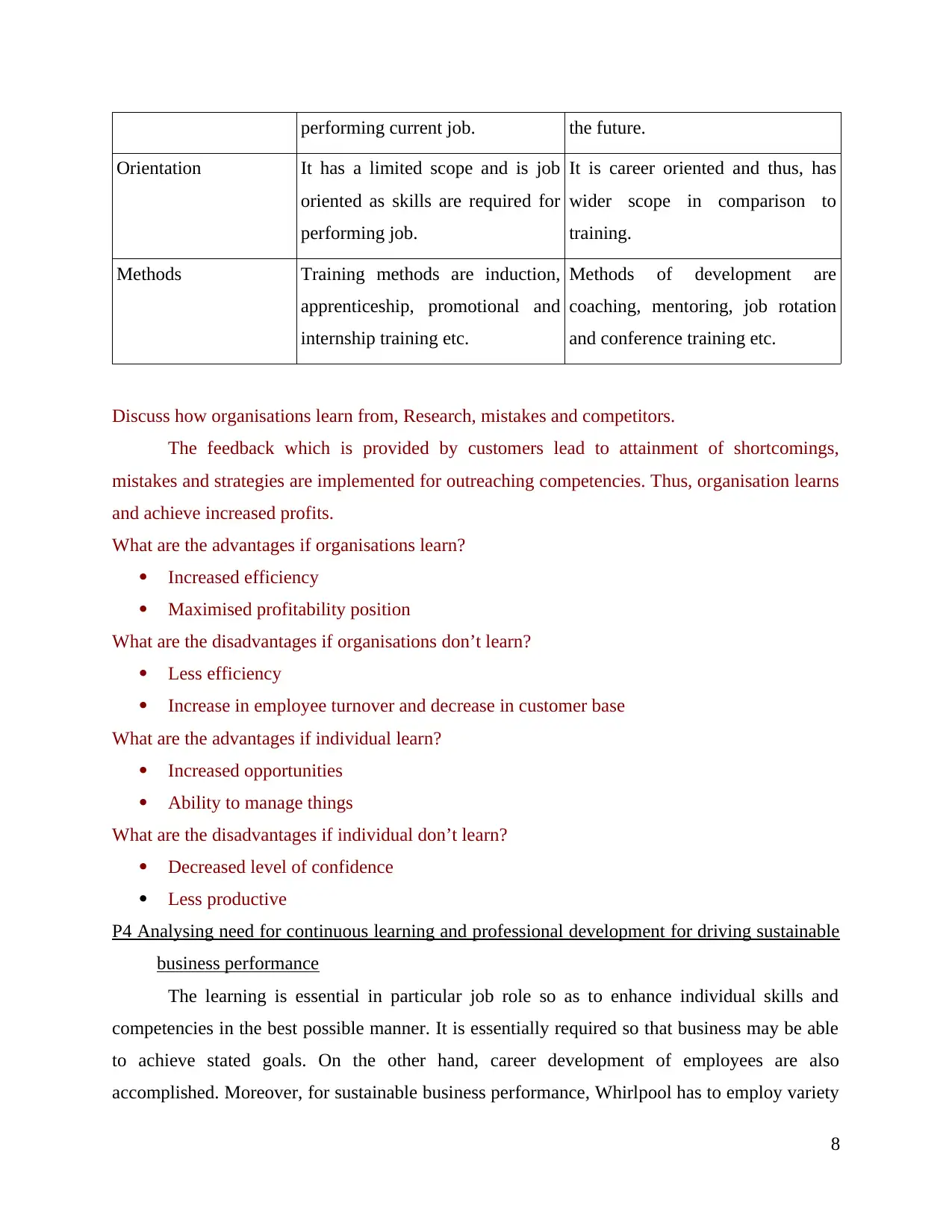
performing current job. the future.
Orientation It has a limited scope and is job
oriented as skills are required for
performing job.
It is career oriented and thus, has
wider scope in comparison to
training.
Methods Training methods are induction,
apprenticeship, promotional and
internship training etc.
Methods of development are
coaching, mentoring, job rotation
and conference training etc.
Discuss how organisations learn from, Research, mistakes and competitors.
The feedback which is provided by customers lead to attainment of shortcomings,
mistakes and strategies are implemented for outreaching competencies. Thus, organisation learns
and achieve increased profits.
What are the advantages if organisations learn?
Increased efficiency
Maximised profitability position
What are the disadvantages if organisations don’t learn?
Less efficiency
Increase in employee turnover and decrease in customer base
What are the advantages if individual learn?
Increased opportunities
Ability to manage things
What are the disadvantages if individual don’t learn?
Decreased level of confidence
Less productive
P4 Analysing need for continuous learning and professional development for driving sustainable
business performance
The learning is essential in particular job role so as to enhance individual skills and
competencies in the best possible manner. It is essentially required so that business may be able
to achieve stated goals. On the other hand, career development of employees are also
accomplished. Moreover, for sustainable business performance, Whirlpool has to employ variety
8
Orientation It has a limited scope and is job
oriented as skills are required for
performing job.
It is career oriented and thus, has
wider scope in comparison to
training.
Methods Training methods are induction,
apprenticeship, promotional and
internship training etc.
Methods of development are
coaching, mentoring, job rotation
and conference training etc.
Discuss how organisations learn from, Research, mistakes and competitors.
The feedback which is provided by customers lead to attainment of shortcomings,
mistakes and strategies are implemented for outreaching competencies. Thus, organisation learns
and achieve increased profits.
What are the advantages if organisations learn?
Increased efficiency
Maximised profitability position
What are the disadvantages if organisations don’t learn?
Less efficiency
Increase in employee turnover and decrease in customer base
What are the advantages if individual learn?
Increased opportunities
Ability to manage things
What are the disadvantages if individual don’t learn?
Decreased level of confidence
Less productive
P4 Analysing need for continuous learning and professional development for driving sustainable
business performance
The learning is essential in particular job role so as to enhance individual skills and
competencies in the best possible manner. It is essentially required so that business may be able
to achieve stated goals. On the other hand, career development of employees are also
accomplished. Moreover, for sustainable business performance, Whirlpool has to employ variety
8
Paraphrase This Document
Need a fresh take? Get an instant paraphrase of this document with our AI Paraphraser
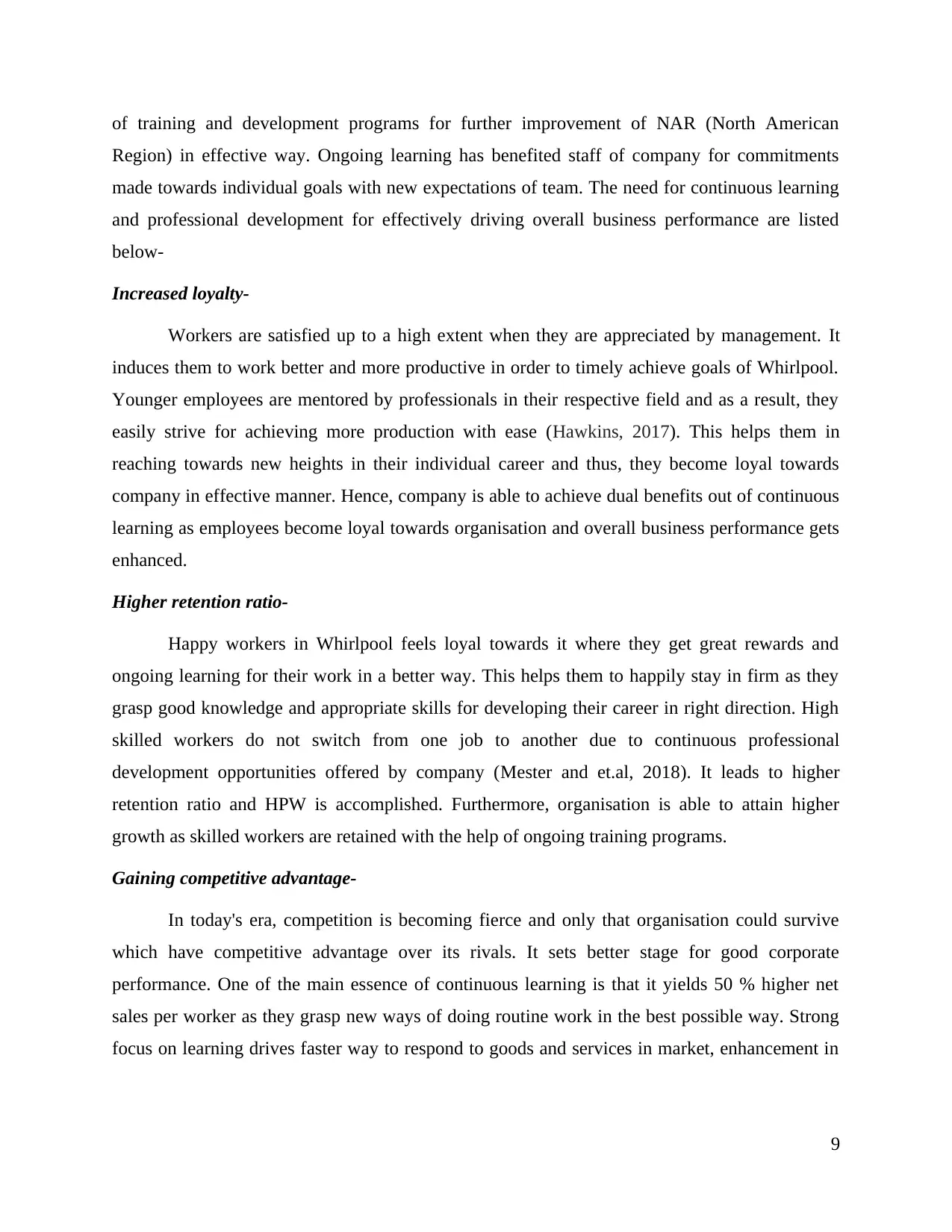
of training and development programs for further improvement of NAR (North American
Region) in effective way. Ongoing learning has benefited staff of company for commitments
made towards individual goals with new expectations of team. The need for continuous learning
and professional development for effectively driving overall business performance are listed
below-
Increased loyalty-
Workers are satisfied up to a high extent when they are appreciated by management. It
induces them to work better and more productive in order to timely achieve goals of Whirlpool.
Younger employees are mentored by professionals in their respective field and as a result, they
easily strive for achieving more production with ease (Hawkins, 2017). This helps them in
reaching towards new heights in their individual career and thus, they become loyal towards
company in effective manner. Hence, company is able to achieve dual benefits out of continuous
learning as employees become loyal towards organisation and overall business performance gets
enhanced.
Higher retention ratio-
Happy workers in Whirlpool feels loyal towards it where they get great rewards and
ongoing learning for their work in a better way. This helps them to happily stay in firm as they
grasp good knowledge and appropriate skills for developing their career in right direction. High
skilled workers do not switch from one job to another due to continuous professional
development opportunities offered by company (Mester and et.al, 2018). It leads to higher
retention ratio and HPW is accomplished. Furthermore, organisation is able to attain higher
growth as skilled workers are retained with the help of ongoing training programs.
Gaining competitive advantage-
In today's era, competition is becoming fierce and only that organisation could survive
which have competitive advantage over its rivals. It sets better stage for good corporate
performance. One of the main essence of continuous learning is that it yields 50 % higher net
sales per worker as they grasp new ways of doing routine work in the best possible way. Strong
focus on learning drives faster way to respond to goods and services in market, enhancement in
9
Region) in effective way. Ongoing learning has benefited staff of company for commitments
made towards individual goals with new expectations of team. The need for continuous learning
and professional development for effectively driving overall business performance are listed
below-
Increased loyalty-
Workers are satisfied up to a high extent when they are appreciated by management. It
induces them to work better and more productive in order to timely achieve goals of Whirlpool.
Younger employees are mentored by professionals in their respective field and as a result, they
easily strive for achieving more production with ease (Hawkins, 2017). This helps them in
reaching towards new heights in their individual career and thus, they become loyal towards
company in effective manner. Hence, company is able to achieve dual benefits out of continuous
learning as employees become loyal towards organisation and overall business performance gets
enhanced.
Higher retention ratio-
Happy workers in Whirlpool feels loyal towards it where they get great rewards and
ongoing learning for their work in a better way. This helps them to happily stay in firm as they
grasp good knowledge and appropriate skills for developing their career in right direction. High
skilled workers do not switch from one job to another due to continuous professional
development opportunities offered by company (Mester and et.al, 2018). It leads to higher
retention ratio and HPW is accomplished. Furthermore, organisation is able to attain higher
growth as skilled workers are retained with the help of ongoing training programs.
Gaining competitive advantage-
In today's era, competition is becoming fierce and only that organisation could survive
which have competitive advantage over its rivals. It sets better stage for good corporate
performance. One of the main essence of continuous learning is that it yields 50 % higher net
sales per worker as they grasp new ways of doing routine work in the best possible way. Strong
focus on learning drives faster way to respond to goods and services in market, enhancement in
9
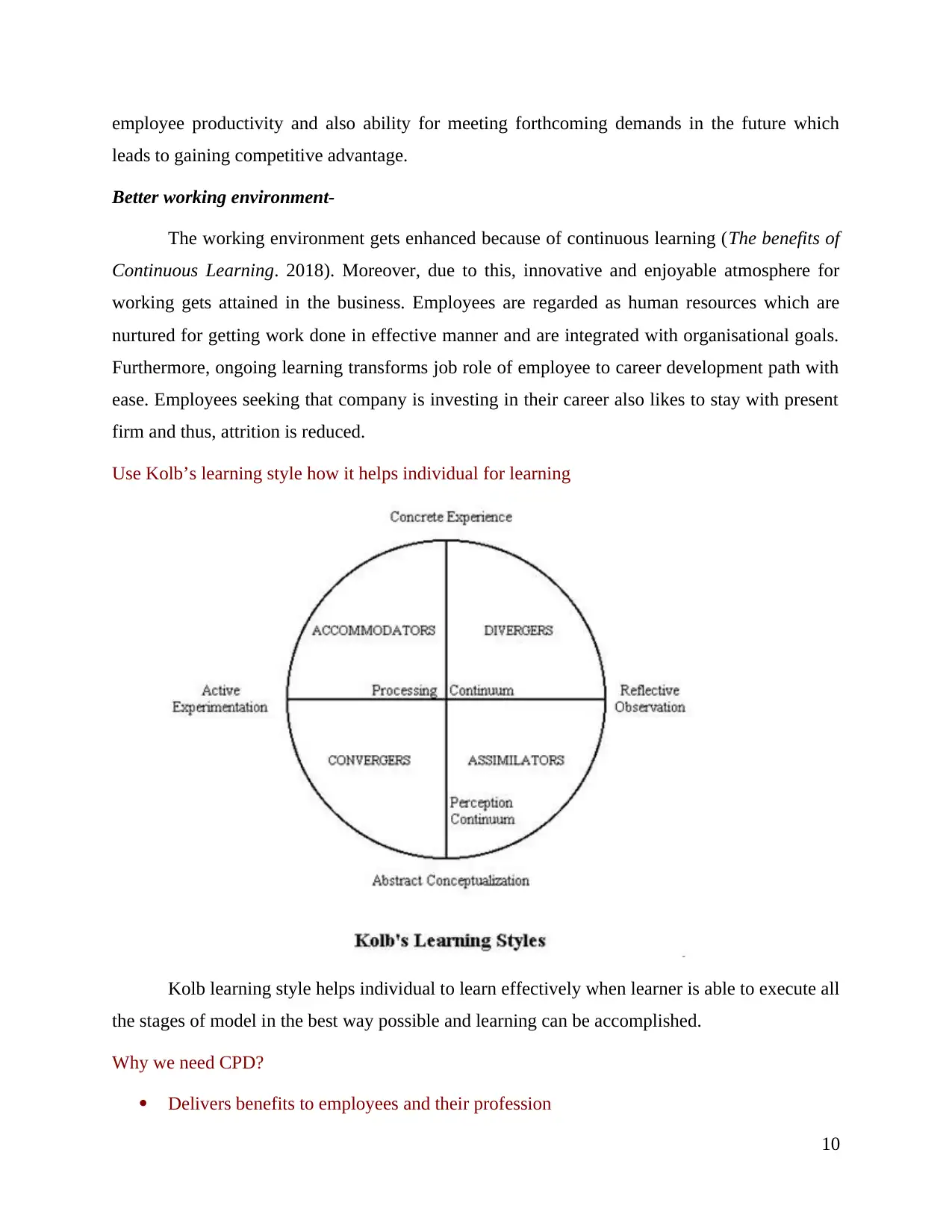
employee productivity and also ability for meeting forthcoming demands in the future which
leads to gaining competitive advantage.
Better working environment-
The working environment gets enhanced because of continuous learning (The benefits of
Continuous Learning. 2018). Moreover, due to this, innovative and enjoyable atmosphere for
working gets attained in the business. Employees are regarded as human resources which are
nurtured for getting work done in effective manner and are integrated with organisational goals.
Furthermore, ongoing learning transforms job role of employee to career development path with
ease. Employees seeking that company is investing in their career also likes to stay with present
firm and thus, attrition is reduced.
Use Kolb’s learning style how it helps individual for learning
Kolb learning style helps individual to learn effectively when learner is able to execute all
the stages of model in the best way possible and learning can be accomplished.
Why we need CPD?
Delivers benefits to employees and their profession
10
leads to gaining competitive advantage.
Better working environment-
The working environment gets enhanced because of continuous learning (The benefits of
Continuous Learning. 2018). Moreover, due to this, innovative and enjoyable atmosphere for
working gets attained in the business. Employees are regarded as human resources which are
nurtured for getting work done in effective manner and are integrated with organisational goals.
Furthermore, ongoing learning transforms job role of employee to career development path with
ease. Employees seeking that company is investing in their career also likes to stay with present
firm and thus, attrition is reduced.
Use Kolb’s learning style how it helps individual for learning
Kolb learning style helps individual to learn effectively when learner is able to execute all
the stages of model in the best way possible and learning can be accomplished.
Why we need CPD?
Delivers benefits to employees and their profession
10
⊘ This is a preview!⊘
Do you want full access?
Subscribe today to unlock all pages.

Trusted by 1+ million students worldwide
1 out of 20
Related Documents
Your All-in-One AI-Powered Toolkit for Academic Success.
+13062052269
info@desklib.com
Available 24*7 on WhatsApp / Email
![[object Object]](/_next/static/media/star-bottom.7253800d.svg)
Unlock your academic potential
Copyright © 2020–2025 A2Z Services. All Rights Reserved. Developed and managed by ZUCOL.





